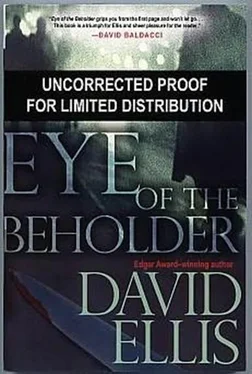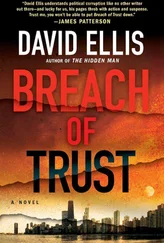The walls are a different story. Corkboard has been attached from floor to ceiling, all the way around three of the four walls. Various documents and photographs are tacked up everywhere.
When Stoletti hits the bottom step, she says, “What the hell is this?”
McDermott walks up and gets a closer look at the items on the wall. A newspaper article from the Watch, a story about the divorce of Harland and Natalia Bentley. A notice from the IRS for under-payment of tax. A newspaper story on Paul Riley leaving the county attorney’s office to start a new law firm. A page downloaded from a Web site called “Russian Serial Killers,” detailing the exploits of Nikolai Kruschenko, who murdered over two dozen prostitutes before being captured in 1988 in Leningrad. A magazine article on Paul Riley’s purchase earlier this year of the home formerly owned by Senator Roche. Page after page, downloaded from Web sites, about Terry Burgos, detailing the murders and his victims. A black-and-white photograph of a young girl standing by a tree.
It goes on and on. There are hundreds of documents.
“This,” McDermott says, “is his office.”
TRY THE DOOR.
A lesson learned from the Brandon Mitchum debacle. But the front security door is locked, as expected, so he pulls out the tension wrench and short hook and picks the lock. He opens the door and closes it delicately behind him. Now inside the main security door, he removes his shoes and walks up the stairs.
One apartment per floor, as he walks up slowly in his stocking feet, gets to the top floor and looks over the door-standard lock, maybe, probably a dead bolt, too-then heads back down the stairwell to the landing, halfway between the second and third floors, so that he’d be out of view if Shelly Trotter were inclined to look through her peephole, Peekaboo, you don’t see me.
He checks his watch, just past four in the morning, she’s sleeping, she’ll be sleeping another two, three hours, probably, so he sits on the landing and waits.
He can wait. He’s good at waiting. He’s been waiting for sixteen years.
I PUSH MYSELF OUT of bed at six, not having slept at all. By seven, I’m in my car. Traffic is already thick. I’m thinking up a creative cussword to describe how I feel about the woman driving in front of me when my cell phone rings. My caller ID says it’s Pete Storino, from Immigration and Customs Enforcement, getting back to me about that favor.
“Pete, you’re up early for a G-man.”
“Don’t say I never did anything for you, Riley.”
“I would never say that, Pete. Never.”
He snickers. “And you didn’t hear this from me.”
“Right. Never heard it.”
“Okay. Gwendolyn Lake, right? You want to know when she left the States?”
“Right.”
“Gwendolyn Lake flew out of the country on Wednesday, June 21, 1989.”
June twenty-first. That was the week of the murders. Wednesday. Three dead by that time. Cassie was killed the following Sunday.
Could have been three months, could have been three days, Gwendolyn had told me, when I asked her how long she’d been gone before Cassie was murdered.
“Where’d she go?” I ask.
“Flew into De Gaulle,” he tells me.
Paris. That makes sense. When I asked Gwendolyn where she might have been around that time, her first guess had been the Riviera. Rich girl like that, she probably has a place there.
“Do you know how long she was there?” I ask, for no apparent reason.
“Can’t help you on that, my friend. The domestic stuff, I can ask for a favor here or there. I have to involve too many people if I call the French.”
“No, no. That’s fine.”
“I assume she was probably staying with family over there,” he adds.
“Family? In France?”
“Gwendolyn Lake is a French national,” he says. “You didn’t know that?”
No, actually, I didn’t. Gwendolyn Lake was born in France? I guess that’s not too surprising. These rich people, jetting about the globe, probably have villas on every continent and can afford elite medical care wherever they are.
Storino continues, “Says here, born in-I’m going to mispro nounce this-Saint-Jean-Cap-Ferrat. September 8, 1969. Anyway, that probably explains the length of her visit”
“How’s that?” I ask. “When did she return to the States?”
“Let’s see-August twenty of ‘ninety-two.”
“‘Ninety-two? She was gone for three years?”
“From the States, oui, oui.”
I thank Pete and punch out the cell phone, digesting that information, while waving off a guy at an intersection who wants to sell me a newspaper.
Gwendolyn Lake left the country the same week that Cassie and Ellie were murdered and didn’t return for three years?
Have we been looking at the wrong troubled young heiress?
McDERMOTT CALLS HOME, talks to his mother and to Grace, explaining his situation. When he’s done, he stretches his arms, shakes the cobwebs from his weary head. Members of the County Attorney Technical Unit are photographing the walls in the basement.
“Dammit,” he says to himself, not for the first time this morning. They found their guy, but they didn’t find him. And it’s not like he just happened to be out running an errand. They raided his place in the middle of the night.
He’s in the wind.
The dust in the basement brings out the worst in McDermott’s allergies. He wipes at his nose and scratches the roof of his mouth with his tongue. By now, he has taken at least a cursory look at every document pinned up to the corkboard on Koslenko’s basement walls. The information is neatly divided into certain categories. Much of the documentation is devoted to the Terry Burgos case, or one of the players involved in it. Harland Bentley. His ex-wife Natalia. Their daughter Cassie Bentley. Terry Burgos. Paul Riley. Even a pair of photographs from a gossip column of Riley and his girlfriend Shelly Trotter, the governor’s daughter.
Another section of the wall contains photographs of women on the street, virtually all of whom look like prostitutes in their on-the-job outfits. Below many of the photos, Koslenko has handwritten their names-at least their street names. Roxy. Honey. Candi. Delilah.
“Jesus, there must be a hundred photos,” he mumbles.
“Close. Ninety-eight,” says Stoletti. “This guy has a real hard-on for hookers.”
“Mike.” Powers, one of the other detectives who has arrived, comes bounding down the stairs. His hand, in a latex glove, holds up a piece of paper. “Found this in his bedroom.”
McDermott, also wearing a latex glove, takes the paper. It’s a Xerox copy of a smaller, typewritten note:
I know that you know about my relationship with Ellie. And I know about your relationship with my daughter. If you tell, so will I. But if you keep quiet, I will endow a chair in your name at Mansbury College.
I need your answer right now.
McDermott rereads the note, then takes a breath. He feels a number of scraggly lines in his brain, now forming into circles.
“Bentley did buy off Albany,” Stoletti says. “Bentley was sleeping with Ellie.”
“And Albany was sleeping with Cassie,” he adds. “Christ Almighty.”
“Koslenko was Bentley’s bagman.” Stoletti takes a breath. “He does Bentley’s dirty work.”
McDermott works that over. Something about it doesn’t seem quite right. His cell phone on his hip buzzes. The call is coming from the station house. “McDermott,” he says, but the reception is weak, the voice of one of his fellow detectives mired in static. “Call you back,” he yells. He takes the stairs and heads outside.
Читать дальше












